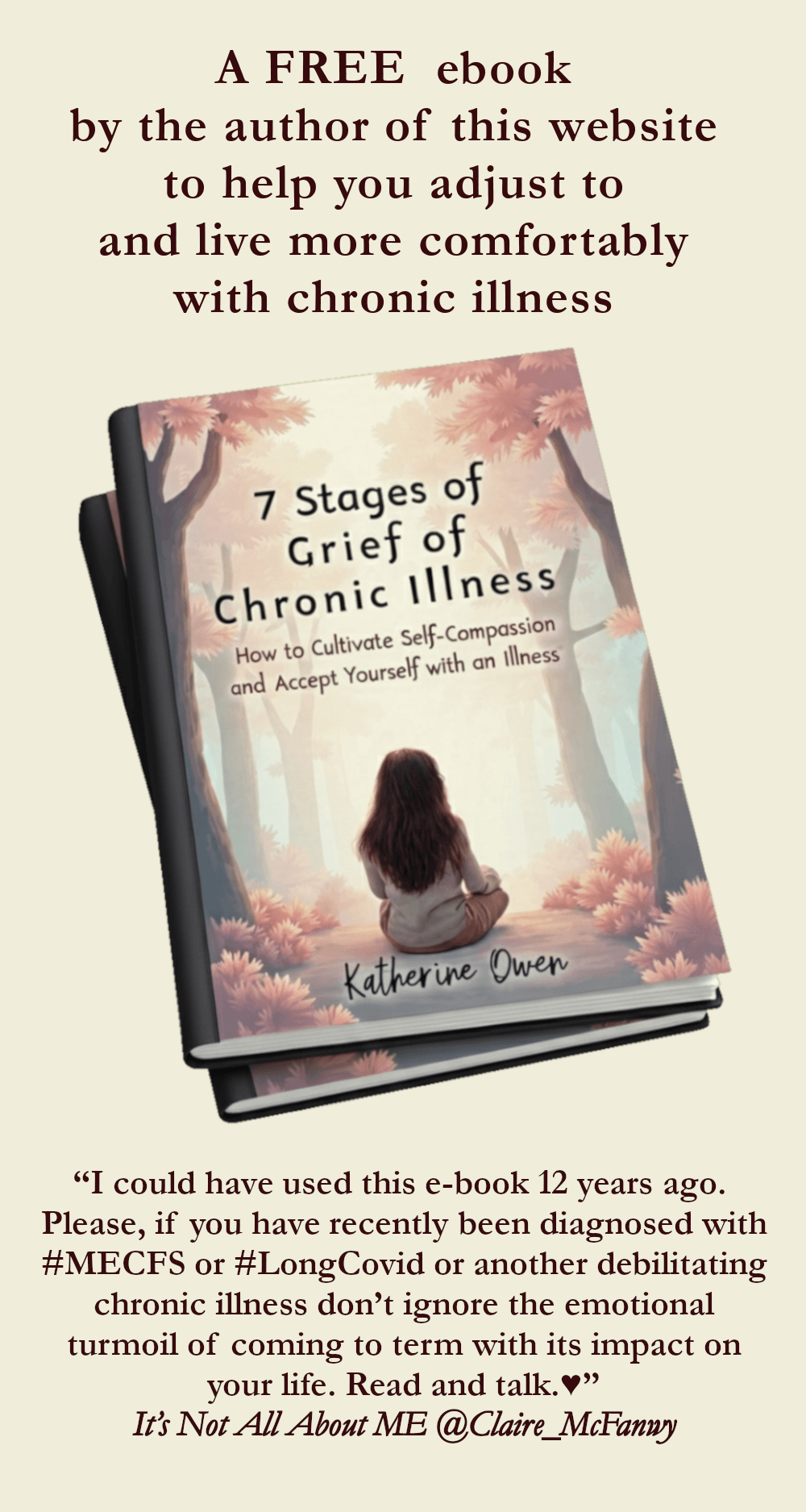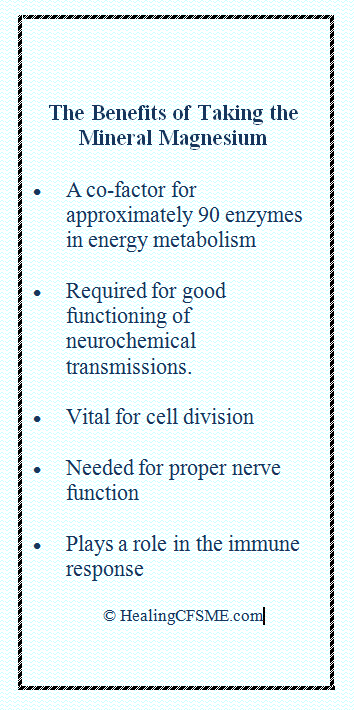and move towards health
Magnesium for ME
the illness Myalgic Encephalomyelitis
This is an article by a #PWME on taking magnesium for ME, that is for the illness Myalgic Encephalomyelitis or Chronic Fatigue Syndrome.
Disclaimer: It is important to say that I’m not trained in the provision of natural healing supplements to others.
Or click here to CHOOSE FROM
A RANGE OF personalizable cards and gifts.
The healing-themed gifts are designed by myself, Katherine, the author of
this website HealingCFSME.com
Proceeds go towards the cost of the website. Thank you. Enjoy!
What follows is very much my personal experience with reference to others more learned on the subject than myself.
My hope is that this article will move you towards deciding whether taking a magnesium supplement is useful for your healing.
Contents for this article
if there is no link, please scroll down
Magnesium: A possible mineral supplement to take for CFS
· CFS / ME and my own experience of Magnesium Deficiency and taking healing supplements
· What are the benefits of magnesium as a mineral supplement?
· In the UK you need a private test for intracellular magnesium
· A potential danger of high long term doses of magnesium
· Which type of magnesium is best for CFS/ME?
· Magnesium injections
· Do Epsom bath salts help CFS/ME pain? My experiment
· Which foods contain magnesium?
· How much magnesium do I take? - what is the safe dose
· What are the signs or symptoms of magnesium deficiency?
CFS MINERALS - Magnesium
CFS / ME and my personal experience of magnesium deficiency
The mineral magnesium is the most important natural healing supplement for me to take.
Tests
have consistently shown that my intracellular levels of magnesium are
low.
During the years when I was more ill, I experienced the
following benefits from taking magnesium:
- a clear reduction in pain
- an increased ability to focus
I recommend that a CFS diet includes sources of magnesium.
If you test low for magnesium, consider taking a magnesium supplement.
What are the benefits of magnesium as a mineral supplement?
Why do we need magnesium in the body?
There are many benefits of taking magnesium, but the following information makes magnesium a particularly relevant mineral for CFS sufferers.
- Magnesium in the body acts as a co-factor for approximately 90 enzymes in energy metabolism.
- Magnesium is required for good functioning of neurochemical transmissions.
- Magnesium is vital for cell division.
- Magnesium is needed for proper nerve function.
- Magnesium plays a role in the immune response.
In the UK you need a private test for magnesium
In the UK, the NHS usually only measures serum magnesium.
This is not a useful test as the levels of serum magnesium will test normal.
"Serum levels are maintained at the expense of intracellular levels. If serum levels change this causes heart irregularities and so the body maintains serum levels at all cost. It will drain magnesium from inside cells and indeed from bone in order to achieve this." (Quote from Dr Sarah Myhill)
To measure your levels of magnesium you need a blood test for intracellular magnesium.
You will probably need to pay privately to have this test.
However,
in the UK, your doctor may be willing to pay for the blood to be
collected and even sent to the clinic as long as you pay for the actual
test.
It is not known if magnesium deficiency is a symptom or related to the cause of CFS/ME.
Click through for Biolab, the private clinic I visited to do blood tests in London, UK.
There are 100 or so tests available, many useful to determine CFS vitamins and mineral deficiencies.
Even if you live elsewhere, it might help you to be aware of the tests
for CFS vitamins that are available.
You can then search online to find a
clinic near you.
Many more options are now available for testing than when I was diagnosed with Myalgic Encephalomyelitis - I was diagnosed before the internet took off!
I know some who have had testing via Dr Sarah Myhill's website.
Click through to read more about tests for vitamin deficiencies as well as other testing relevant to those diagnosed with CFS or ME.
The dangers of high dose magesium supplementation
There is no single recommendation I can give to you as a visitor to this website. We are all different.
Dr Chandler Marrs is co-author of Thiamine Deficiency Disease, Dysautonomia, and High Calorie Malnutrition.
According to her, there is a potential
problem with high dose supplementation of magnesium for someone who has thiamine deficiency. It can further impair the
production of thiamine, vitamin B1.
Thiamine is needed in order for the
mitochondria to work well – and therefore for you to have sufficient energy.
(Magnesium deficiency can also cause thiamine deficiency.)
Ideally we would all have our own functional medicine practitioner, and have regular test of our levels of magnesium vitamin B in order to know what to take. In practise of course many of us cannot afford such tests.
Which type of magnesium is best for CFS/ME?
I know of people who have received no benefit from taking one form of magnesium and great benefit from taking another.
One friend only gets benefit when she uses a magnesium spray!
For myself I take a plant based mineral supplement each day which includes magnesium. Usually, I also take a magnesium supplement.
Cost is a definite issue for me. If it wasn't, I would probably experiment more to find the optimum way for me to absorb magnesium.
To answer the question on which form of magnesium is most
available to the body, I include the following extract from an interview by
Wendy Myers with Dr Jess Armine.
This interview was provided by the
organisation Health Means.
Health Means offer frequent
summits on various holistic health issues.
Dr. Armine: When I recommend a calcium and magnesium
supplement, I usually like to make sure that the calcium magnesium is in that
two to one ratio.
Some of the better forms of calcium are magnesium glycinate and magnesium
threonate.
I like the glycinate forms because they’re basically an amino acid chelate.
What does that mean?
When you look at different substances, like magnesium aspartate, magnesium citrate, or calcium carbonate, ... the carbonate is the carrier ion. So when it hits hydrochloric acid in your stomach, it breaks apart.
And what it’s supposed to do is release free calcium to be
absorbed by the gut. But in the case of calcium carbonate, you think you’re getting a lot of
calcium, but you’re not, because when you put it in hydrochloric acid, it
becomes the bicarbonate ion and calcium chloride, which is limestone.
Essentially you’re creating a rock. And
it doesn’t get absorbed. So you can take as much of that as you like. You’re
not only neutralizing the acid, you’re preventing absorption.
And the ion that’s created is not available for the body for absorption.
But
when you have an amino acid chelate, like magnesium glycinate or any of the
more available forms, when it hits the hydrochloric acid, it separates.
And that calcium magnesium, or whatever ion that you want to
be absorbed, is available by the body.
So it’s really important, the form that
you take, and to make sure that you have a really absorbable form.
Katherine Owen: I haven’t asked for permission to print the above extract. Please do not
treat it as something you yourself have permission to copy and share. I will remove it in haste if asked to do so.
I share it with grateful thanks, and with hope that the people involved will be blessed by you knowing about their expertise.
You can find Dr. Armine at www.methylationsupport.com
Magnesium injections
Research into magnesium deficiency by Dr David
Dowson was published in The Lancet March 1991.
This showed that 80% of ME
sufferers benefited significantly from injections of magnesium sulphate.
As a result, Magnesium injections may be available on the NHS in the UK.
I believe there have been subsequent trials where the results for the benefits were not conclusive.
I had two magnesium injections when severely ill. There was no dramatic improvement in my general health, but my sleep improved which I believe to have been a consequence.
(At the time, with limited care, my life was so demanding that it was difficult to monitor results of any treatment for CFS.)
Dr Sarah Myhill finds that magnesium injections frequently lead to reduced symptoms in her patients.
Do Epsom bath salts help CFS/ME pain? My experiment
In 2004, a study at the School of Biosciences, University of Birmingham, UK, showed that bathing in Epsom Bath Salts could effectively increase sulfate and magnesium levels in the body.
This makes taking baths in epsom bath salts a possible way to take minerals for CFS.
I tried a 1-Kg bag of Epsom bath salts from an Amazon store to try out the above advice.
For a 15 gallon bath you will require 600 grams.
I love my baths so it seemed a great way of absorbing this important mineral.
Result:
600g is a larger amount than I realised and you will want to buy enough for a number of baths.
If you have muscle fatigue as a symptom, you would need to have the salts delivered. Your parcel will probably be too heavy for many people with CFS/ME to carry for themselves.
I didn't notice any improvement in symptoms or reduction in pain. But I do find the baths very soothing, so I have continued using epsom bath salts and if they are a way to take minerals for CFS, so much the better!
One way of taking magnesium and making sure to combine it with other important minerals is to take a multi mineral. I recommend these plant based minerals which I take every day. (This is my affiliate link).
Which foods contain magnesium?
Foods that contain magnesium are listed below.
Perhaps this explains my love of spinach and avocados. I must remember to eat more of them!
Dark chocolate, I seem to remember to eat :-)
 Avocado is a food rich in the mineral magnesium
Avocado is a food rich in the mineral magnesium- spinach
- chard
- pumpkin seeds
- yogurt
- almonds
- black beans
- avocado
- figs
- dark chocolate
- banana
Tip: Many people with CFS/ME have problems with digestion. If you have trouble digesting almonds, you can soak them overnight in water.
I have a protein shake for breakfast each morning. One of the recipes is a delicious Cinnamon and Almond shake.
I make it the night before. I have just realised I am accidentally following the advice for soaking nuts!
Magnesium is needed for vitamin B1 metabolism, so if you take a magnesium supplement it may also correct vitamin B1 deficiency.
How much magnesium do I take? - what is the safe dose
Dr Sarah Myhill gives advice on how much magnesium to take - the safe daily dose. She writes.
"The recommended daily allowance is 300mgs for men, 350mgs for women.
Magnesium is extremely safe by mouth – too much simply causes diarrhoea.
Try increasing the amount of magnesium you take by mouth until it
causes diarrhoea,
then reduce the dose slightly so it does not."
Click through to read more about magnesium for CFS/ME on Dr Sarah Myhill's excellent website.
What are the signs or symptoms of magnesium deficiency?
The signs or symptoms of magnesium deficiency are as follows:
- muscle cramps
- weakness
- tiredness
- constipation
- numbness and tingling e.g. restless legs
- hypoglycemia
- insomnia
- heart rhythm problems (a serious magnesium deficiency leads to arrhyhtmia detectable on an (electrocardiogram) ECG
- vertigo
- nausea
- Low vitamin D and low vitamin K can also result from magnesium deficiency
I hope this article has helped you in your decision as to whether or not to take Magnesium for ME / CFS.
Wishing you health both within and beyond illness,
Katherine
Katherine T Owen
Katherine T Owen runs this website - www.HealingCFSME.com.
She is author of Be Loved, Beloved (Read it in paperback at lulu.com or on kindle)
Click on the link below to move from Magnesium for ME /CFS to read advice on vitamins that may help manage or alleviate symptoms of CFS / ME. Also information on making your own protein drink.
- Home Page
- CFS Vitamins Minerals
- Magnesium
Receive daily inspiration...
by putting your favorite (favourite) healing quote on
a mug, cushion, postcard, coaster, T shirt etc.
You will find my zazzle gift store at
zazzle.com/HealingStore.
Use one of my designs or start from a blank.
Thank you from me, Katherine, author of HealingCFSME.com
 |
© Katherine T Owen. All articles on this website are copyrighted. I am delighted if you choose to click above to share this page on social media, but please
do not copy, print or otherwise use without my permission. Thank you. Disclaimer:
I am not a medical practitioner. The articles on this website are not
to be taken as medical advice. Please consult a medical practitioner as
necessary. |











